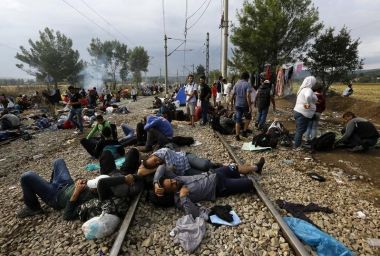Syrian refugee crisis on Greece/Macedonia border

Crowds of migrants and refugees were building on Greece's border with Macedonia on Saturday after a cold, wet night spent in the open, their entry slowly rationed by Macedonian police and soldiers.
Most of them Syrian refugees, the crowd of several thousand shouted "Help us!" at lines of riot police behind razor wire, stationed on the border since Thursday when Macedonia declared a state of emergency and sealed the frontier.
Some 600 were allowed through overnight, packed onto a 5 a.m. train at the Gevgelija railway station and sent north to Serbia, the last stop en route to Hungary and Europe's borderless Schengen zone.
More could be seen arriving by foot on the Greek side as morning broke.
On Friday, Macedonian police fired tear gas and stun grenades to drive back angry crowds of Syrians, Afghans, Iraqis and others seeking passage through the impoverished Balkan country, the latest flashpoint in a crisis that has dragged the conflicts of the Middle East to Europe's doorstep.
Families gathered around open fires in fields soaked by rain overnight. They had no access to shelter and little food or water.
"It's really cold here," said 30-year-old Faroq Awais, from Pakistan, waiting for a train in Gevgelija. "Last night it was raining and we couldn't go anywhere inside. We were sleeping against the walls of a building but it didn't help."
Police said the next train would leave in several hours.
For weeks, the railway station was a scene of chaos. Up to 2,000 migrants and refugees from the Middle East, Africa and Asia poured over the border daily and pressed to board trains going north, small children squeezing through open carriage windows. Over 40,000 entered Macedonia in the past two months. Some 50,000 hit Greek shores by boat from Turkey in July alone.
The Macedonian government said it could take no more and sent riot police and the army to the border. But the pace of entry being allowed appeared insufficient to alleviate the crush the other side of the riot police lines.
"A lot of people got on the train and we gave priority to women and children," said Aleksandra Davidovska of the local Legis non-governmental organisation providing support for migrants and refugees.
"The situation is okay at the moment because people are sleepy; but in the middle of the day they might be more frustrated."











